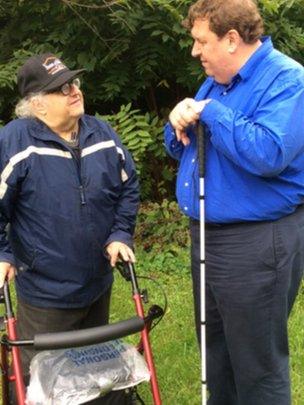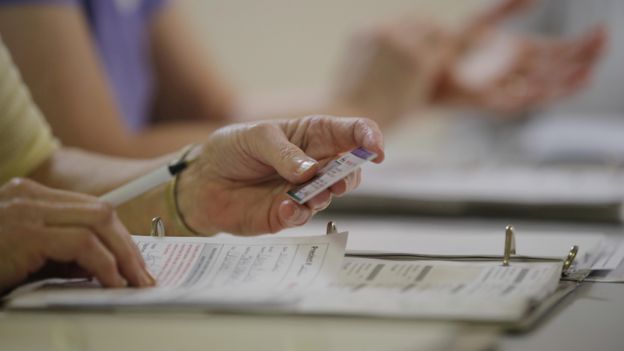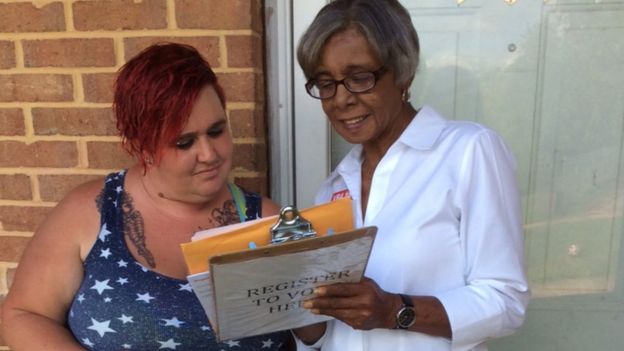No More Stolen Elections!
Unite for Voting Rights and Democratic Elections
ID laws disenfranchise poor voters across the country

67-year-old Leroy Switlick is angry.
He's angry because he's made three separate trips to the Division of Motor Vehicles (DMV) office in Milwaukee to get a photo ID so he can vote in next month's general election.
Each time he's come away empty-handed.
Leroy has voted in every presidential election for more than 40 years, but Wisconsin's new voter ID law means that even though he's registered, he will not be able to cast his ballot without showing photo ID such as a driving licence or passport.
"It's silly," he says.
Switlick, who has been partially sighted for most of his life, never learned to drive - and so never had a driver's license. He was not previously required to have a state-issued ID for any other purpose.
"The first question the man behind the counter asked me was 'Can I see your photo ID?' Now if I'm coming to get a photo ID, how can I already have a photo ID?"
Each time he visited the DMV, he took a satchel full of documents including his birth certificate.
But the DMV never actually examined his papers.
On the second visit, the official he had been told to ask for simply didn't show up; and on the third occasion, accompanied by a lawyer, he was told the computers were down, though officials at DMV's head office told his lawyer later there had been no record of a computer problem on that day.

Leroy says the clerk just shrugged his shoulders and said "I don't know."
He's is one of an estimated 300,000 registered voters in Wisconsin who may not have the requisite ID to cast their ballot under the state's new rules.
His lawyer from the American Civil Liberties Union, Karyn Rotker, says her client has faced obstruction.
"This is a gentleman who is elderly, disabled and on a fixed income... having to pay out of pocket for cab rides to the DMV.
"There are a lot of people who have been given the run-around and he's one of them."
In response to questions from the BBC, the Wisconsin DMV did not deny Mr Switlick had paid three unsuccessful visits to their office to obtain an ID.
They say the reason he still doesn't have one is that he is now refusing to respond to contacts they've made to him. If he did, they say, he would get one within six days.
Mark Thomsen, the chair of the Wisconsin Elections Commission, says he's concerned about how the DMV is handling requests for temporary ID cards that allow people to vote.
But he's giving the division the benefit of the doubt that it will iron out the glitches.
"If it doesn't, it will be the entity that has to face a federal judge."
Wisconsin is not the only state to have introduced a requirement for voters who are already registered to show photo ID at the polls. Supporters of voter ID laws argue that they are needed to prevent electoral fraud.
Wisconsin Governor Scott Walker says his state's legislation will make it "easier to vote, but hard to cheat" and that the law is justified even if only one fraudulent vote in prevented.
Mr Thomsen says he has seen no evidence that impersonation has been a problem in the state. And a researcher at Loyola Law School found only 31 cases of credible voter impersonation that would have been stopped by such laws between 2000 and 2014 across the US, out of a billion ballots cast.
The Brennan Center at New York University has been keeping track of voter ID legislation around the country. It says that despite the striking down of laws in states such as North Carolina, there are still eight states that will have strict photo ID laws for the first time in a presidential election, accounting for more than 80 electoral College votes out of 538.
"We're not just talking about 10 people here and there", says Adam Gitlin, counsel in the Democracy programme at the Brennan Center.
"Estimates suggest that 11% of eligible voters in the United States lack one of the forms of photo ID that are generally required by these strict photos ID laws, and they are disproportionately black, Latino, low income, students and elderly voters."
 Image copyrightREUTERS
Image copyrightREUTERSIn southern Virginia, Barbara Lee echoes that analysis.
She's spent her life as a Democratic activist, and now goes door-to-door in low income neighbourhoods registering voters.
Virginia has similar requirements to Wisconsin. It will issue a free ID for voters who can get to a local registration office, but, says Barbara, that's not so easy when the office is only open weekdays and shuts for an hour at lunchtime:
"If this one woman works at Walmart and rides the city transit, and this one's babysitting her children, then when she gets off work she's coming home and it's after six o'clock. There's no way that babysitter can get down town, there's no way that Walmart worker can get down town."
Court action continues against the laws in both Virginia and Wisconsin, though it seems unlikely there will be much change before 8 November.
Bruce Spiva, a partner at Perkins Coie law firm, is involved in the litigation in both states. He says the restrictions could affect the outcome in close races such as Virginia and Wisconsin, depressing the Democratic vote.

But fighting the law is about more than just this election, Spiva says.
"Everyone has a fundamental right to vote and to participate and so that's the issue here: the denial of that right,"
While supporters of photo ID laws around the country argue that opinion polls show overwhelming support for the idea, Barbara Lee becomes quiet and pensive when I ask her what she thinks motivates the new laws.
"It's like going back to segregation," she says after a moment's pause.
"It disenfranchises poor people, and that's heart-breaking."
